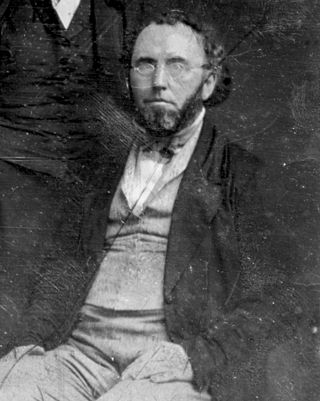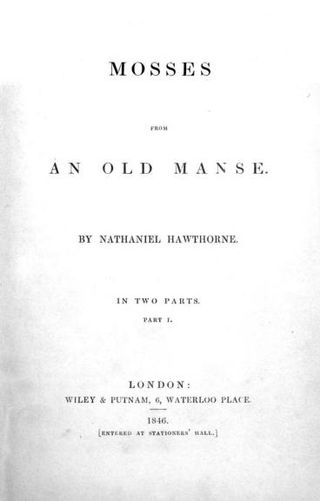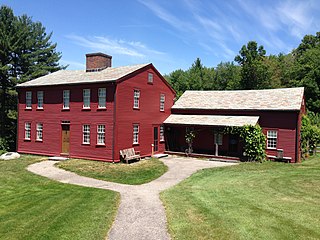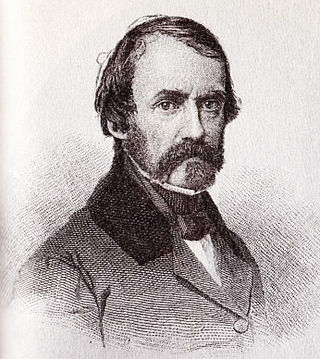
Edgar Allan Poe was an American writer, poet, editor, and literary critic who is best known for his poetry and short stories, particularly his tales of mystery and the macabre. He is widely regarded as a central figure of Romanticism in the United States, and of American literature. He was one of the country's earliest practitioners of the short story, and is considered the inventor of the detective fiction genre, as well as a significant contributor to the emerging genre of science fiction. He is the first well-known American writer to earn a living through writing alone, resulting in a financially difficult life and career.
Transcendentalism is a philosophical movement that developed in the late 1820s and 1830s in the New England region of the United States. A core belief is in the inherent goodness of people and nature, and while society and its institutions have corrupted the purity of the individual, people are at their best when truly "self-reliant" and independent. Transcendentalists saw divine experience inherent in the everyday, rather than believing in a distant heaven. Transcendentalists saw physical and spiritual phenomena as part of dynamic processes rather than discrete entities.

Brook Farm, also called the Brook Farm Institute of Agriculture and Education or the Brook Farm Association for Industry and Education, was a utopian experiment in communal living in the United States in the 1840s. It was founded by former Unitarian minister George Ripley and his wife Sophia Ripley at the Ellis Farm in West Roxbury, Massachusetts, in 1841 and was inspired in part by the ideals of transcendentalism, a religious and cultural philosophy based in New England. Founded as a joint stock company, it promised its participants a portion of the farm's profits in exchange for an equal share of the work. Brook Farmers believed that by sharing the workload, they would have ample time for leisure and intellectual pursuits.

Frances Sargent Osgood was an American poet and one of the most popular women writers during her time. Nicknamed "Fanny", she was also famous for her exchange of romantic poems with Edgar Allan Poe.

George Ripley was an American social reformer, Unitarian minister, and journalist associated with Transcendentalism. He was the founder of the short-lived Utopian community Brook Farm in West Roxbury, Massachusetts.

Mosses from an Old Manse is a short story collection by Nathaniel Hawthorne, first published in 1846.

"Al Aaraaf" is an early poem by American writer Edgar Allan Poe, first published in 1829. It tells of the afterlife in a place called Al Aaraaf, inspired by A'raf as described in the Quran. At 422 lines, it is Poe's longest poem.
Sophia Willard Dana Ripley (1803–1861), wife of George Ripley, was a 19th-century feminist associated with Transcendentalism and the Brook Farm community.

Charles Anderson Dana was an American journalist, author, and senior government official. He was a top aide to Horace Greeley as the managing editor of the powerful Republican newspaper New-York Tribune until 1862. During the American Civil War, he served as Assistant Secretary of War, playing especially the role of the liaison between the War Department and General Ulysses S. Grant. In 1868 he became the editor and part-owner of The New York Sun. He at first appealed to working class Democrats but after 1890 became a champion of business-oriented conservatism. Dana was an avid art collector of paintings and porcelains and boasted of being in possession of many items not found in several European museums.

Fruitlands was a utopian agrarian commune established in Harvard, Massachusetts, by Amos Bronson Alcott and Charles Lane in the 1840s, based on transcendentalist principles. An account of its less-than-successful activities can be found in Transcendental Wild Oats by Alcott's daughter Louisa May Alcott.

Charles Frederick Briggs, also called C. F. Briggs, was an American journalist, author and editor, born in Nantucket, Massachusetts. He was also known under the pseudonym "Harry Franco", having written The Adventures of Harry Franco in 1839, which was followed by a series of works dealing more or less humorously with life in New York City.

Sarah Helen Power Whitman was an American poet, essayist, transcendentalist, spiritualist and a romantic interest of Edgar Allan Poe.
This article lists all known poems by American author and critic Edgar Allan Poe, listed alphabetically with the date of their authorship in parentheses.

"The Imp of the Perverse" is a short story by 19th-century American author and critic Edgar Allan Poe. Beginning as an essay, it discusses the narrator's self-destructive impulses, embodied as the symbolic metaphor of The Imp of the Perverse. The narrator describes this spirit as the agent that tempts a person to do things "merely because we feel we should not."

Charles Lane (1800–1870) was an English-American transcendentalist, abolitionist, and early voluntaryist. Along with Amos Bronson Alcott, he was one of the main founders of Fruitlands and a vegan.

Abby Morton Diaz was a teacher, women's rights organizer, and industrial reformer.

Parke Godwin was an American journalist associated with New York.

The 1889 Princeton Tigers football team was an American football team that represented Princeton University as an independent during the 1889 college football season. The team compiled a perfect 10–0 record, shut out six of ten opponents, and outscored all opponents by a total of 484 to 29. The team captain and quarterback was Edgar Allan Poe, the second cousin of his namesake, the writer Edgar Allan Poe.

The American Union of Associationists (AUA) was a national organization of supporters of the economic ideas of Charles Fourier (1772–1837) in the United States of America. Organized in 1846 in New York City as a federation of independent local Fourierist groups, the AUA published a weekly magazine called The Harbinger and published more than 70 books and pamphlets, which helped it to enjoy a brief moment of influence spreading the ideas of communitarianism to a circle of leading intellectuals.
George Partridge Bradford was an American writer and teacher.
















